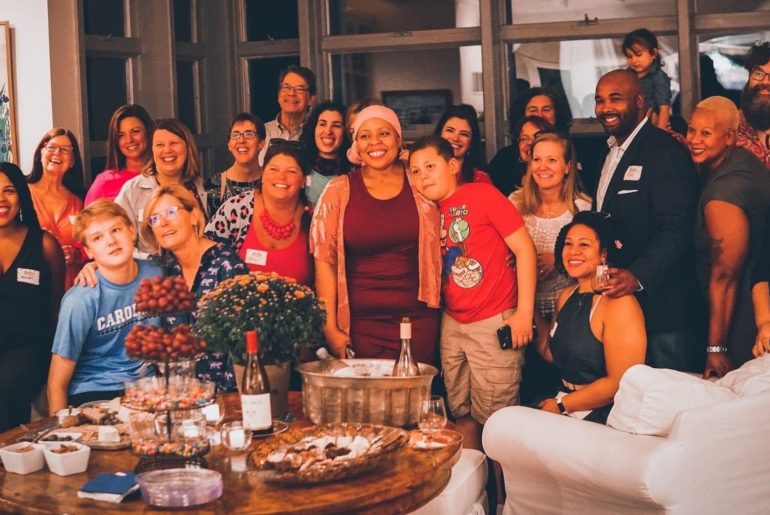To Maricka, from the Editors:
This week we share an incredibly moving story written by Maricka Oglesby about her journey through diagnosis and treatment for a rare form of cervical cancer. But first, a love letter to Maricka. We want you to know who she is.
Her life is about helping women find their voice, to be able to share their stories and truths and find their place in the community. I met her when she became co-producer of the Baltimore WOW Festival – a festival produced by Notre Dame of Maryland University that celebrates the power of women and girls, and brings speakers and programs together to discuss issues that affect women across social and cultural boundaries. Over the last five years, her deep understanding of women’s issues, and how they all intersect and affect each other and everyone around them, has become encyclopedic – mention an issue and she knows who is doing what to research, write and mobilize around it. In her role as Director, Women’s Leadership Institute of Baltimore at NDMU, she is working to recognize the accomplishments of Baltimore women and develop the next generation of leaders. Her work truly makes a difference in our city.
Maricka, you’ve got this! You are a person who grows from every experience you have. You find a way to deal, and then you turn it into a path that others can follow to be stronger. We hope, even though COVID kept us away from being with you, that you felt the love this year. And THANK YOU! for sharing your story.
Maricka’s Story
Many who know me understand how important words are to me. This piece shares some of the words I will never forget from the diagnosis and treatment of a rare and aggressive form of cancer that shook my world at the age of 43.
“Good Luck”
On a sunny, spring afternoon on a Tuesday in April 2019, an OB/GYN sat me down and handed me a set of lab results. As she explained medical terms that looked to me like alphabet soup, her voice became distant as the words “malignant,” “cervical,” and “sarcoma” jumped off the page and into my consciousness. Numbness began in my hands as I held the results, crept up my arms, stalled in my shoulders, and made its way to my neck. I slowly lifted my dizzied head and looked around the room at everything and nothing. After that, everything went in slow motion until I heard her tell me “good luck” as I auto-piloted my way out of her office. My partner and I began towards the parking lot, feeling confused, stunned, and hoping for the best. I didn’t make it past the lobby before my shaking legs forced me to sit down as emotions washed over me. A week to the day, we would be sitting in a specialist’s office hearing words that would focus every fiber of my being on preserving my very existence.
“It’s my job to save your life.”
The words of Dr. Kimberly Levinson will forever ring in my ears. Certain words and phrases are easy to understand as the one above. Others are more difficult to comprehend and process, like medical terms with syllables you can barely string together. Once I learned how to pronounce embryonal rhabdomyosarcoma and about its rare and aggressive nature, I knew I would never forget it. As I struggled to process these facts and trust the doctors caring for me, the words “It’s my job to save your life” convinced me that it was clear they had my best interest at heart. Understanding the severity, prognosis, and treatment of this pediatric soft-tissue cancer that typically presents in children and is particularly challenging for adults was perplexing. Finding the words to share this news with your child, parents, sister, and loved ones was nearly impossible.
There was little time to process the medical terms and recommended procedures. Action needed to be swift. Thinking the word “cancer” to myself was something I was coming to terms with. Saying it aloud to others proved more challenging, so I found gentler phrases to use that eased the shock for myself and my loved ones. After many tears, rearranging schedules, and way too many Google searches, I decided to share the news with my beautiful son, Cian. Of the moments of my life, that was and still is the most poignant I can remember. His bright eyes, immense maturity, and innate optimism lifted my spirit and outlook. He hugged me tightly and told me, “Don’t worry, Mom. We will take care of you. All you have to do is rest and get better.”
After consultations from renowned Hopkins and GBMC oncologists, researchers, and a host of experts, I was given a mere three days to prepare for a complete hysterectomy. With my head and heart in a whirlwind of scant understanding of what was to come, I begged to have the weekend for time to prepare myself and my family. My uterus, ovaries, cervix, fallopian tubes, and ovaries were removed on April 29, as I was full of fear, uncertainty, and a swell of emotion. I was thrust into instant menopause at the age of 43 years and seven days. The best hopes were that all of the malignant cells were removed and that nothing had metastasized. After six weeks of mental and physical healing, the next phase would begin.
“We have to manage your toxicity.”
During the weeks following the diagnosis and hysterectomy, I must admit that I was blissfully unaware of what the next phase held and what chemo treatments would be like. Part of me assumed it would be like others I had seen undergo a weekly or bi-weekly treatment that was over in an afternoon for six months or so. The oncology team told me that my therapy would span a year to include inpatient and somewhat experimental protocols. This was another moment when time seemingly stood still.
The initial outpatient treatments produced several unexpected side effects. Still, I thought to myself as I was surrounded by supportive and loving family and friends, “I got this!” Nothing prepared me for the first long night of inpatient treatment and seeing a friendly and smiling nurse suit up in personal protective equipment complete with a faceguard, smock, and double latex gloves to protect himself from the very drugs that would be going directly into my veins.
As a reasonably stoic person, I’m able to withstand a fair amount of discomfort. After a total of four treatments, my shoulder-length hair was gone, and I was experiencing crippling side effects. At a certain point, I was forced to wave the white flag and detail the severe side effects to the medical team. After only the first few of 46 treatments, I finally understood the intense treatment plan and impact of the medications. After hearing doctors say the words “We have to manage your toxicity,” I knew it would take every ounce of support and strength to make it through the next year – and that was before we entered a global pandemic.
Resilience, Support, and Outlook
A cancer diagnosis, intense chemotherapy, mental health challenges, and managing COVID with a suppressed immune system have, as I said before, changed everything about my life. Being surrounded by the radiant love of my family, circle of friends, and incredible medical care have shown me that if I can get through that, I can get through anything. I pray that I am as much of an example to my son as he was for me during that tender, bare moment when he shifted my outlook with just a few words.
Just over a year after my last treatment, my body is nearly fully healed. I hope that after another year of monitoring, scans, and bloodwork, I will receive that designation I’m waiting for – in remission. Even without those words, I know that I am a survivor, and I would not trade the lessons I have learned about myself for anything. Onward.
–Maricka Oglesby




